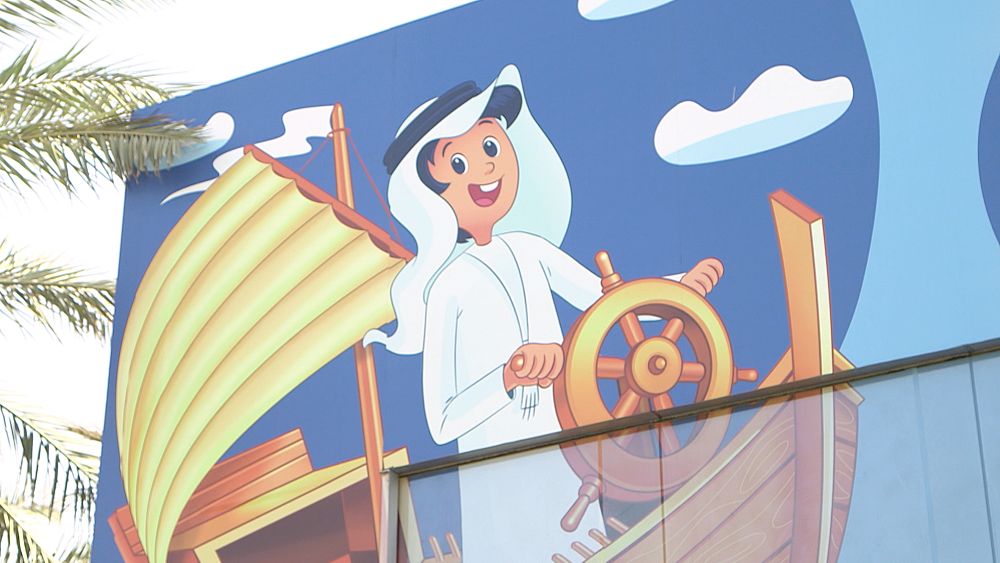
For many children in the Middle East and North Africa, who have grown up almost exclusively watching international animations, finding relatable cartoons can be a challenge.
The primary problem appears to be the characters not physically resembling, or speaking the same language, as them.
This was a source of frustration for Jordanian father Ibrahim Taha, who was looking for educational and entertaining cartoons to teach his son Arabic.
Unable to find engaging content, he created his own songs on a guitar and the homegrown cartoon, Adam Wa Mishmish, was born.
“I think with Arabic language, the content is weak, especially when it comes to music,” composer Ibrahim told Inspire Middle East’s Salim Essaid, remarking on how Arabic cartoons often use basic instruments and unappealing voices to deliver messages.
“That’s talking down to children, not to children,” he added.
Today, there are eight seasons of Adam Wa Mishmish on television, online, and on social media.
The series aims to teach children, irrespective of their nationality, their Arabic numbers and letters, plus educate them about musical instruments like the ‘ney’.
Cartoons about the popular Middle Eastern flute, says Adam’s mother, Luma Al Adnani, teaches little ones to love their heritage and themselves.
“I think we have this complex as Arabs, that we are lesser than Western countries,” added the Adam Wa Mishmish CEO.
Relatable reflections
Representation in media from an early age, is key to establishing a child’s self-worth, according to Tufts University in the United States.
The institution cites that when children witness negative, or no representation, of people who look and speak like them, it can prompt feelings of shame and invisibility.
Researchers at the centre believe that these feelings can often carry through into adulthood.
This theory resonates with Syrian-born, Reem Ali-Adeeb, a lead character designer at Warner Brothers Entertainment in Los Angeles.
She created a YouTube channel called Susupereemo, to teach children how to draw familiar, animated Arabic characters.
“It builds confidence in kids, that someone who looks like me, someone who speaks like me, can be someone important,” she said.
40 years of Majid
In the UAE, Arabic language cartoons make up less than 30% of children’s programmes aired in the country, according to Abu Dhabi Media (ADM).
Defying the statistics, is the much-loved Emirati comic and cartoon Majid, which has been providing empowering and educational content for children for around four decades.
Children spanning the Middle East have grown up with the adventures of the 11-year-old and his friends, and this year, the multi-platform 'Majid Universe' was launched.
Taking Majid into a new technological age, the platform integrates mobile, television and online entertainment.
Content-wise, ADM used focus groups to find out what children really want to watch.
The findings revealed they yearned for more imperfect, humorous & complicated on-screen personas.
“They felt content, Arabic content, was very preachy and too informative. They would just shut down,” said Mariam Al Serkal, the head of platforms at Majid. “And this was an excellent turning point. We understood they wanted [something] entertaining & funny. This completely changed the way we wrote scripts and the way we thought about characters.”
Fitting the revised cartoon brief is an aspiring scientist called Fateen, who is voiced by 13-year-old Mohamed Al Marzooqi.
The two boys share a thirst for knowledge.
“In every show, it has a story and something to learn,” he told Euronews.
Then there's Fateen’s menacing sister Dana, played by 11-year-old voice actor Mariam Hamad.
Much like Al Marzooqi, the young Emirati says she identifies easily with her character, especially in terms of sibling rivalry.
“I want to hit my brother, when she wants to hit her brother,” chuckled Hamad. “She’s [Dana’s] a little bit feisty, like me.”
SEEN ON SOCIAL MEDIA : GIVING BACK
Jordanian illustrator Nada painted this mural at a pediatric clinic in Amman.
"cartoon" - Google News
November 20, 2020 at 11:30PM
https://ift.tt/35OAMOb
Children in the Middle East & North Africa want funnier, relatable Arabic cartoons - Euronews
"cartoon" - Google News
https://ift.tt/2s88pJG
https://ift.tt/3dvq7t1
Bagikan Berita Ini

















0 Response to "Children in the Middle East & North Africa want funnier, relatable Arabic cartoons - Euronews"
Post a Comment